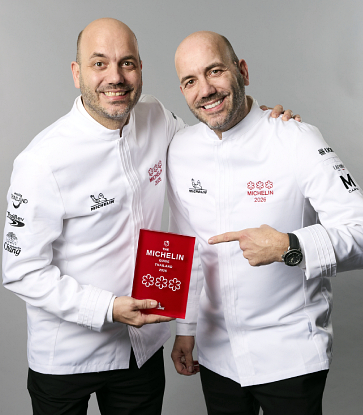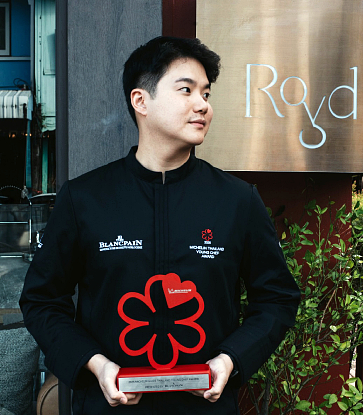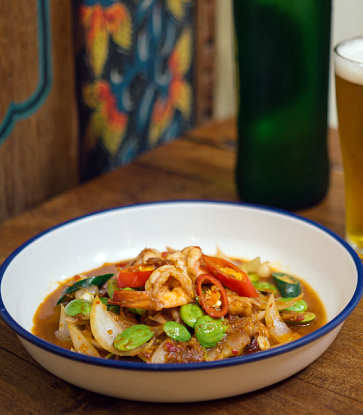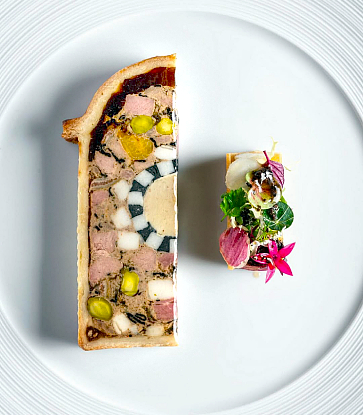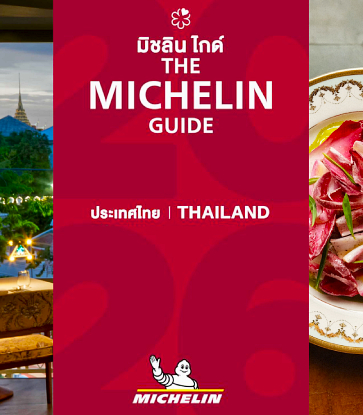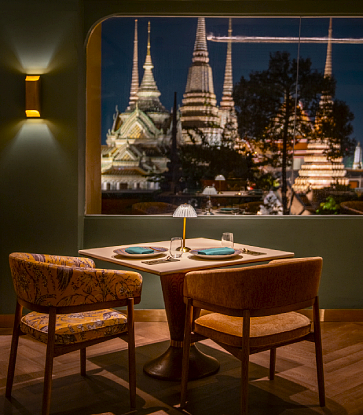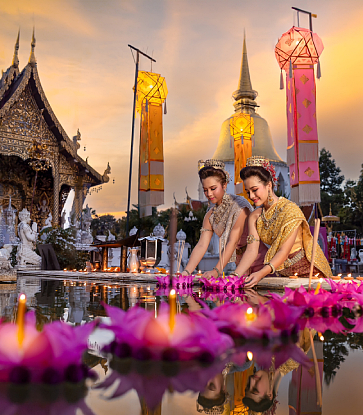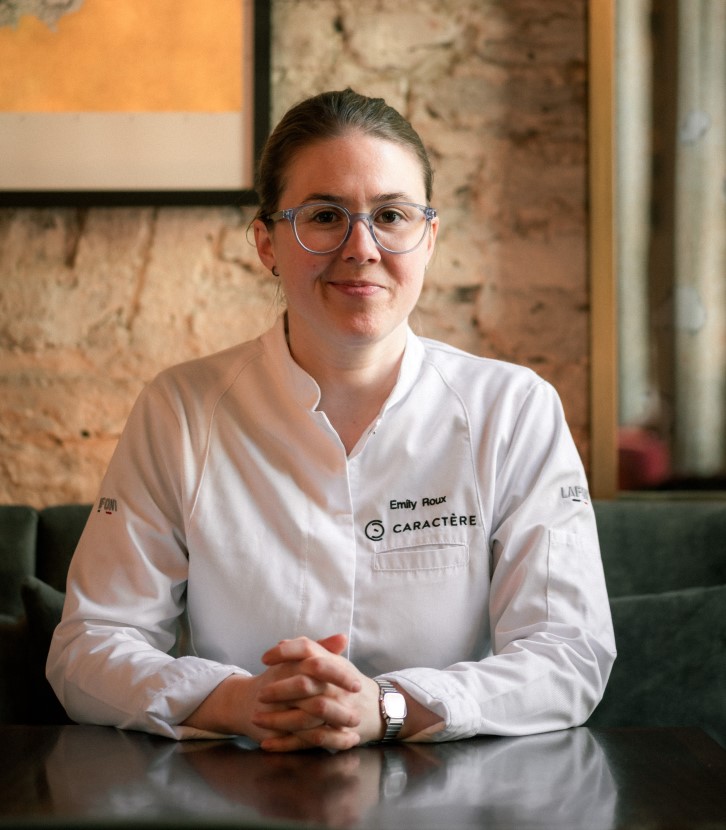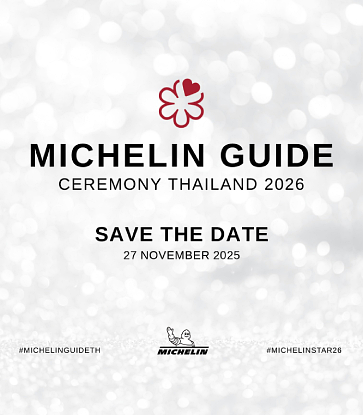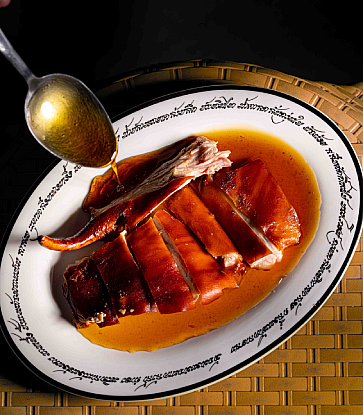Can you talk about your cooking philosophy at 80/20?
Joe: We specialise in modern Thai cuisine at 80/20, highlighting local ingredients. Before the big renovation last year, 80% of our ingredients were locally-sourced and 20% had to be imported because they were not available in Thailand. That’s where the name of our restaurant came from. After the renovation, we decided to go almost 100% with local Thai ingredients because there are certain things that we just can’t find in Thailand. We aim to go 100% with local produce by the end of next year. Also, we want to be the opposite of traditional and authentic. We want to try to engage in some forward-thinking and innovation is a part of it. We apply modern techniques, using modern equipment and tools that you can find in the modern kitchen today to create new dishes based on fundamental Thai flavours. We also try to add more textures and complexity.
Can you talk about your background before 80/20 happened?
Saki: We both lived in Canada for about 10 years. I started with a little cupcake shop and worked at a French restaurant because a lot of French people live in Canada. When I came back to Japan, I learned about traditional Japanese sweets called wagashi. Then when I came to Thailand, I started learning how to make Thai desserts.
Joe: I’m born and raised in Bangkok and moved to Canada when I was about 18 years old. I met Saki and we lived together there for 10 years. I started working at a small restaurant and then at this French restaurant so my background is more like French-Canadian inspired.
Saki: His mum used to have a Thai restaurant. My mum has been cooking and baking since I was little so both our mothers have a huge influence.

Tell us a little bit about how you work together.
Saki: I do the pastry and he does the savoury but most of the time we exchange our inputs.
Joe: It was not that easy at the beginning (haha). Each of us has his own lane and we try not to step on each other’s lane. We start with our ideas and work together to develop them, bearing in mind mine and her vision for each dish. We then bring it up for discussion at the table with the team. At 80/20, I believe that our uniform helps to remind us that we are all students, which means we can always keep learning new things. We’re always eager to exchange knowledge with people around us. A lot of our kitchen staff come from different parts of Thailand. We have staff members from many regions of Thailand – the north, south and northeastern regions and they’re a fountain of knowledge for us. It’s what we rely on to improve our dishes.
Where/who did you get your passion for cooking from?
Saki: My mum. Definitely. She baked, cooked and fermented stuff all the time. She’s very much into Japanese cooking methods. She makes miso, she bakes cakes and makes her own bread so that was the kind of influence I was exposed to as a kid. I first started off my career in hospitality but I got bored. I liked cooking at home so I started going to pastry school. I then became more interested in it and signed up for a course in European desserts. With some knowledge on Japanese cuisine and desserts, I then started making my own desserts, and here I am.
Joe: Similar background. When I was a kid - because I was the only child - my mum liked to cook. My mum would ask me to help her out in the kitchen all the time when all I wanted to do was play basketball. I hated it at first. Now as a grown-up, I wish I’d paid more attention to what she was doing at the time. She’s older now and just wants to relax. “I’m not going make that dish for you unless you peel all the shallots, garlic, and chillies for me,” she’d say. My mum is from the south of Thailand so if she needs curry, she’d make it from scratch. I’d always make fun of her because if she wanted to cook today, she’d have to start preparing the ingredients the day before. It takes so much hard work.

Can you talk about the dessert you’ll be cooking at the gala dinner?
Saki: The theme for this year is Chiang Mai so we wanted to raise awareness on the dangers of wildfires. Slash and burning, bonfires and cigarettes can all play a part in causing forest fires which result in the extinction of bees and air pollution and it’s very bad for the environment and the ingredients we use. We will use coconut charcoal to highlight the wildfire and strawberry as it is in season in November. We will also pair our dessert with a tea.
Joe: We will make the base of this tea with strawberry which will be fermented first and then dehydrated. Along with these ingredients, we will use sweet osmanthus flower (dok hong mung lee). This flower has a very nice aroma which goes very well with strawberry. The highlight will be chocolate.
Tell us more about this chocolate.
Joe: We actually found a chocolate farm near Chiang Mai through our local contact and it’s highly recommended because it’s organic. Coincidence turned into passion. At first, the owner was only growing figs and also macadamia nuts but then he was introduced to cocoa trees so he planted around 300 at first. He soon became successful and now has more than 5,000 cocoa trees. He’s having so much fun with it he wants to grow more!

How do you source and select ingredients from Chiang Mai or other provinces?
Joe: We actually work very closely with a handful of suppliers. When something new is in season or something truly special and unique is available, they’ll contact us. Often times, they’d just send us the samples. They are very helpful because since the reopening of our restaurant, we haven’t had much time to travel. We preferred to stay in the kitchen. We will try explore more starting from next year.
Saki: Before, we used to forage - go fishing down south, for example. That way, we get to discover more ingredients ourselves.
Will you be using a special cooking technique to bring your dessert to life?
Saki: For this event, we will use more modern techniques, less Thai techniques, but the flavours will be very Thai since we’ll be using coconut cream, strawberries - all Thai ingredients.
Joe: We want to make it very light but still creamy and rich, with strong smoky flavours of the coconut to represent the wildfire. We want to bring out the freshness of the strawberry as it will complete very well the smokiness of the cream and the strawberry.

At this MICHELIN Star Revelation event, sustainability is a very important theme. We aim for zero food waste going to the landfill. First, what does sustainability mean to you?
Joe: To eat today, now, and in the future. What I mean by that is I totally believe that, sometimes specifically in Thailand, the word ‘organic’ or ‘sustainable’ can be overused without a true understanding of what it means. For me, it’s to be able to manage our food sources. How can we manage to have the same thing we eat today for the next 10 or 20 years? Eating is the end result of where we are in our own environment. To create a better future for food in the future, we have to take care of the environment and sustainability is just a part of it.
How to you avoid food waste at 80/20?
Saki: For example, if we get a whole fish, we’d serve the fillets - the best part of the fish - to our guests. All the other parts such as bones, guts, head, we use to make fish sauce. With vegetables such as pumpkin skin, for example, we make oil or even kombucha. Sometimes as well, we use only leaves of kale and stem parts are used for staff meals. Try not to waste the ingredients. It doesn’t make sense - we only use that small portion of the product and throw away the rest - there’s so many things we can do with them.
Joe: We can bring out even more value from the same ingredient so we try to experiment. Try to use it as much as we can - every part: the seed, the skin, the stem. Something we do with the tomato stem, for example, which I think is very cool, is we ferment and dehydrate until it until it becomes really dry. We use that as a spice to season the fish or roast meat.

What’s so special and unique about northern Thai food? How would you compare northern Thai cuisine to Thai cuisine in other provinces?
Joe: I believe it has more dry spice. I find a lot of dishes very fresh like laarb sod, laarb neua. It has less acidity compared to other Thai regions. For example in Isaan, laarb is more sour and has more bitterness but here it has more saltiness, more umami.
What’s your favourite Northern Thai dish?
Saki: I’d say Khao Soi. It’s closest to Japanese curry, but the noodles version. And I love Thai noodles!
Joe: I confirm, she loves noodles! I really love Nam Prik Noom and pork crackling. It’s my go-to snack at any point in time.

Do you foresee any upcoming food trends about to happen in Bangkok?
Joe: Many Thai restaurants are offering a set menu which is interesting. Of course, so are we. I predict that in a year or two that the a la carte format will slowly come back. I totally believe that Thai food has, in a way, started to lose its main purpose of bringing people and families together. Everybody in Bangkok now eat out at a restaurant. I would love to see or help bring food back to basics. For us, we’d like to see if we can create another restaurant where it’s more of a normal setup. It doesn’t have to be fine dining, but straight-up great food.
Saki: I think chefs who cook Thai cuisine are very proud of what they’re doing. Before, this may have not been the case. Most people love Thai cuisine but it was underrated compared to French or Japanese cuisine. Now, I think Thai chefs are very proud to be cooking Thai food. More and more Thai chefs also appreciate Thai ingredients much more than they used to.
Do you think the arrival of the MICHELIN Guide has triggered some of these trends or not at all?
Joe: I think it’s everything combined. People have come to realise that what we have in our hands in terms of ingredients is special. Now, I think it’s more than just a trend that people want to use local ingredients.
Saki: I think the MICHELIN Guide helps to motivate culinary students or upcoming chefs to work harder so they can get a MICHELIN Star so they can shine the spotlight on more Thai ingredients and Thai cuisine. I think it helps a lot.

What does the MICHELIN Guide mean to you?
Saki: It’s a big, big award. It makes me very nervous. It motivates us as chefs to become better at what we do. Most of the time, chefs are not appreciated so it’s nice to be recognised by receiving this kind of award.
Joe: For me, I don’t really give credit to myself much. I tend to look out for mistakes or what I’ve done right or wrong. But with this recognition, I would get some sort of recognition that would help boost my confidence in what I do in a sense that I can be more confident of my ideas about food, that we can be different. For me, I worked at many restaurants, but never at any Michelin-starred ones. I kind of threw myself into doing my own research and developed my own style. With this recognition, it would be a proof to me that we might have just done something right.
What’s the key to your success? Any advice for young chefs who want to start up a restaurant in Thailand or anywhere else in the world?
Joe: Believe in yourself. Believe in your differences and just keep doing what you believe in. Also, believe in your team.
Saki: We’d be nowhere without them.
Joe: Yeah. To work with people who believe in your vision and are able to see it clearly, that’s special. We’d never be here without them. Value your team, value yourself, and value your own beliefs.
Saki: Yes. We’ve been through so much in the past four years but we refused to give up. This is what we love to do so we have to keep going at it no matter what happens.
What makes you happy?
Saki: When guests smile, I guess.
Joe: I’m really into learning and, of course, cooking for people. What I do has become a part of us and who I am. Until the day I die, I will never want to stop learning about food.



